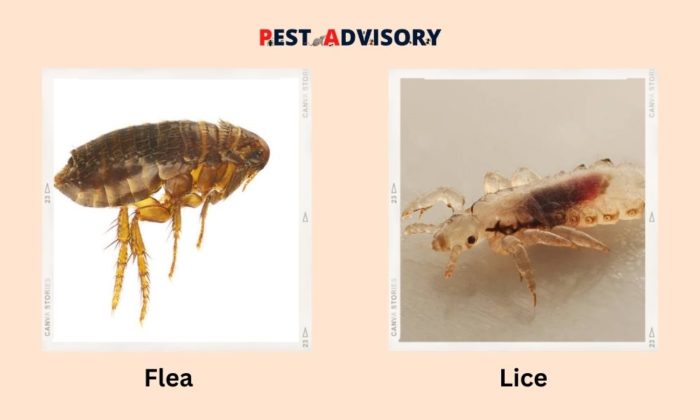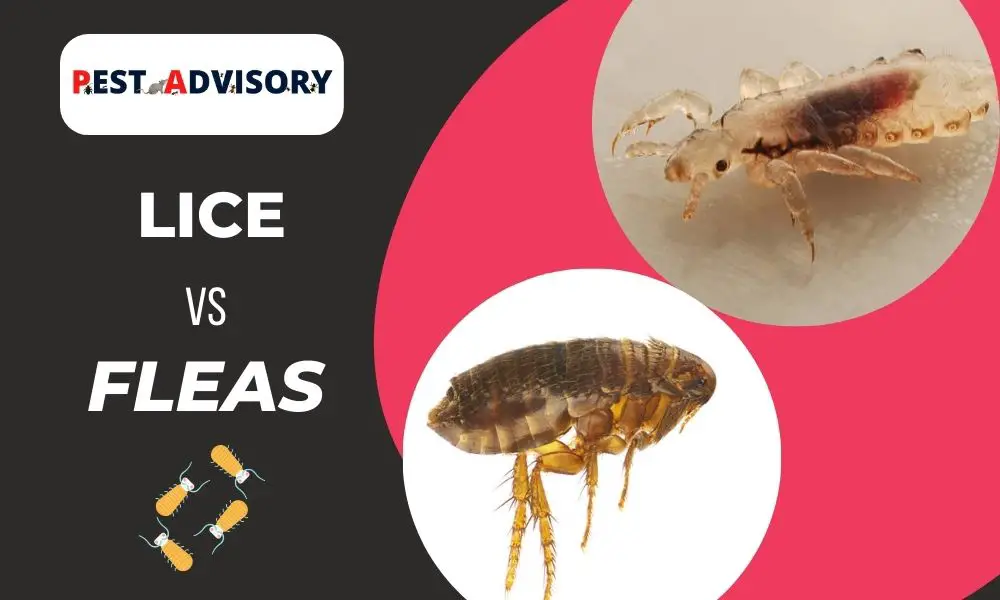Fleas and lice are both parasitic organisms that need blood for their survival. You might feel that they are organisms of the same class.
Are they really the same? No. They are not.
They belong to different biological classes. Their respective classes have many species of both fleas and lice. They have similarities in terms of feeding and a few other habits and differences in other aspects.
Important Note: If you're tired of pests and want a reliable solution, then you should definitely consider seeking help from a professional pest control company. DIY solutions can be effective, but if you're dealing with a significant pest infestation, you don't want to rely solely on DIY methods. Pest control companies typically don't charge huge fees. You can fill out this form to receive free quotes from the top local pest control companies, and compare the quotes and see for yourself. Then, finally, your pest problems will be eliminated for good.
You will get information about fleas and lice, symptoms of their bites, and ways to protect yourself from their infestation in this article. So, let’s jump into the article.
What Are Fleas and Lice?
Fleas are parasitic creatures that can make any mammal or bird its host. It needs blood to survive.
Lice are parasitic organisms usually found in the hairs of human beings. They suck a little amount of blood to survive and lay eggs.
It is easy to spot lice and nits in hair against the dark background. They are usually white or grey. On the contrary, it is comparatively difficult to spot fleas in our pets.
Lice are found only in humans, while fleas are found in many animals, including human beings.
Fleas are usually reddish-brown, while lice are white or grey. Both are six-legged wingless organisms and can bite their hosts.
Fleas are flat, while lice are oval. Usually, adult lice are larger than adult fleas. Fleas can move very quickly while lice cannot.
| Fleas | Lice | |
|---|---|---|
| Size | 1-4 mm in length | 1-4 mm in length |
| Appearance | Wingless and flattened, with a tough exoskeleton for protection | Wingless and flattened, with a smaller and more delicate body structure |
| Diet | Blood of mammals and birds | Blood of mammals and birds |
| Habitat | Prefer warm and humid environments, often found on hosts or in their bedding and living spaces | Live on the hair and skin of hosts, particularly on the scalp |
| Life cycle | Egg → Larva → Pupa → Adult | Egg → Nymph → Adult |
| Reproduction | Females lay eggs on their host, which then fall off and develop in the environment | Females lay eggs on the hair shafts of their host, which hatch into nymphs |
| Health risks | Can transmit diseases such as bubonic plague and murine typhus, and cause allergic reactions and skin irritation | Can cause intense itching, and can lead to bacterial infections if scratched excessively |

Symptoms of Flea and Lice Bites
You know by now that both fleas and lice are parasites and have biting teeth in their mouth.
Flea bites are usually characterized by red spots on human skin and itching and irritation. It is harmless in most cases and can cause allergies sometimes.
On the contrary, it is difficult to acknowledge the presence of lice. They are usually found in hairs, and their bites are usually harmless.
It might lead to itching in the hair if the lice population is large enough. In some cases, the itching might lead to allergies and further problems.
You should get it treated as soon as possible to eliminate the possibility of infections. Never ignore these minute negligible organisms as they can cause severe health issues.
Health risk of Flea and Lice
Fleas
- Fleas can bite humans and animals, causing itching, redness, and discomfort. Some people and pets may also experience an allergic reaction to flea saliva, which can result in more severe symptoms.
- Fleas are known to transmit diseases and parasites, including tapeworms, typhus, and cat scratch fever. In rare cases, they may also transmit more serious illnesses like a plague and murine typhus.
- Fleas can cause anemia in pets and animals, especially in young or elderly animals, if the infestation is severe enough.
Lice
- Lice can also cause itching and discomfort, as well as redness and inflammation of the skin.
- Lice can transmit diseases, including trench fever and epidemic typhus.
- While lice are not known to transmit serious illnesses, severe infestations can lead to anemia in humans and animals.
Ways to Prevent Flea and Lice Infestation
There are many possible ways to remove fleas and lice. But it is best to stop the growth of their population in the very first place.
If you find fleas or lice, do not panic. These are commonly found parasites and can be removed completely by taking the correct action.
You can use natural products like essential oils, vinegar, salt, baking soda, and many more. These all can act as effective flea repellents and flea killers.
You can also use chemicals like bleach and other products used by exterminators if they do not go away using natural products.
Clean your home and bathe your dogs and pets regularly to remove fleas.
You can use vinegar or coconut oil to remove lice from your hair. Clean your hair regularly and comb the wet hair to eliminate lice from them.
Also, you can use a fine-tooth comb to comb your hair to get rid of lice. Contact and visit a doctor in case of severe itching to get the lice removed.
Final Words
Both fleas and lice can cause allergic reactions in their respective hosts. So, remove them first using natural products and use chemicals if they don’t work.
Contact pest control services in case of fleas and the doctor in case of lice if you cannot get rid of them by using home remedies yourself.
That’s it for now. We hope that you got the desired information about fleas and lice.

